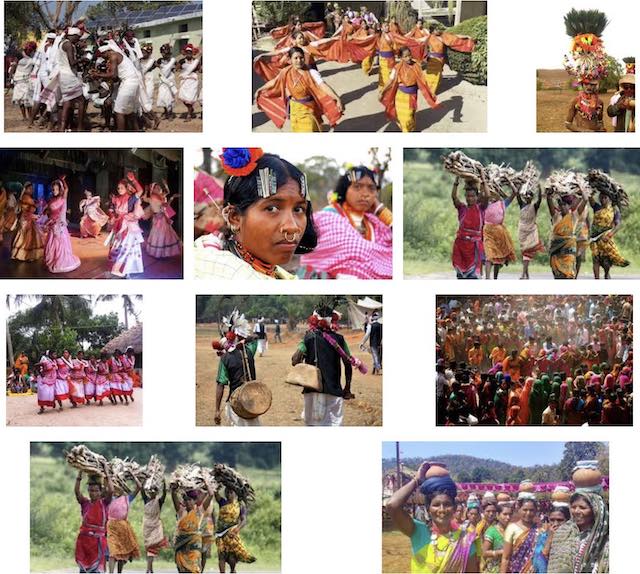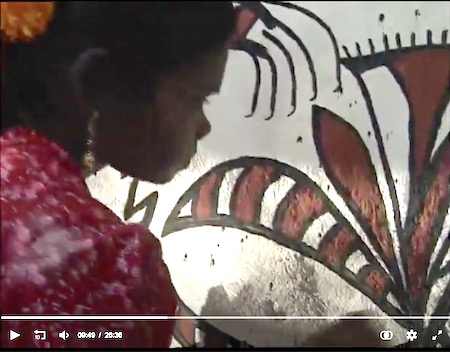Madhya Pradesh has the largest Tribal population of all the states. […]
Due to the varied socio-cultural and geographical environment and its parameters, the diverse tribal world of Madhya Pradesh not only has been largely cut-off from the mainstream of development but has, on this account, also been a cause of concern and special effort for the Central and State Governments since Independence. […]
Source: Tribal Research and Development Institute
Address: http://www.trdi.mp.gov.in/
Date Visited: Sun May 24 2015 19:13:23 GMT+0200 (CEST)
LIST OF SCHEDULED TRIBES
1. Agariya.
2. Andh.
3. Baiga.
4. Bhaina.
5. Bharia, Bhumia, Bhuinhar, Bhumiya, Bharia, Pando.
6. Bhattra.
7. Bhil, Bhilala, Barela, Patelia.
8. Bhil, Mina.
9. Bhunjia.
10. Biar, Biyar.
11. Binjhwar.
12. Birhul, Birhor.
13. Damor, Damaria.
14. Dhanwar.
15. Gadaba, Gadba.
16. Gond, Arakh, Arrakh, Agaria,Asur, Badi Maria, Bada Maria, Bhatola, Bhimma, Bhuta, Koilabuta, Koliabhuti, Bhar, Bisonhorn Maria, Chota Maria, Dandami Maria, Dhuru, Dhurwa, Dhoba, Dhulia, Dorla, Gaiki, Gatta, Gatti, Gaita, Gond, Gowari, Hill Maria, Kandra, Kalanga, Khatola, Koitar, koya, Khirwar, khirwara, kucha, Maria, Madia, Maria, Mana, Mannewar, Moghya, Mogia Monghya, Mudia, Muria, Nagarchi, Nagwanshi, Ojha, raj, Sonjhari Jhareka, Thatia, Thotya, Wade Maria, Vade Maria, Daroi.
17. Halba, Halbi.
18. Kamar.
19. Karku.
20. Kawar, Kanwar, Kaur, Cherwa, Rathia, Tanwar, Chattri.
21. Keer (in Bhopal, Raisen and Sehore districts). DELETED
22. Khairwar, Kondar.
23. Kharia.
24. Kondh, Khond, kandh.
25. Kol.
26. Kolam.
27. Korku, Bopehi, Mouasi, Nihal, Nahul, Bondhi, Bondeya.
28. Korwa, kodaku.
29. Majhi.
30. Majhwar
31. Mawasi.
32. Mina (in sironj sub-division of vidisha district). DELETED
33. Munda.
34. Nagesia, Nagasia.
35. Oraon, Bhanka, Dhangad.
36. Panika (in Chattarpur, Datia, Panna, Rewa, Satna, shahdol, Sidhi, and Tikamgarh Districts).
37. Pao.
38. Pardhan, Pathari, Saroti.
39. Pardhi (in Bhopal, Raisen and Sehore Districts).DELETED
40. Pardhi, Bahellia, Bahcllia, Chita Pardhi, Langoli, Pardhi. Phans Pardhi, Shikari, Takankar Takia, (in (1) Bastar, Chindwara Mandla, Raigarh, Seoni and Sarguja districts. (2). Baihar tahsil of balaghat district, (3) Betul and Bhaisdehi tahsils of Betul district. (4) Bilaspur and Katghora tahsils of Bilaspur district, (5). Durg and Balod tahsils of Bilaspur district, (6). Chowki, Manpur and Mohala Revenue Inspectorors’ Circles of Rajnandgaon district, (7). Murwara, Patan, Sihora, tahsils, of Jabalpur district, (8). Hoshangabad and Shoagpur tahsils of Hoshangabad district and Narsinghpur district, (9). Harsud tehsil of Khandwa district, (10). Bindranawagarh, dhamtri and Mahasamund tahsils of Raipur district).
41. Parja.
42. Sahariya, Saharia, Seharia, Sehria, Sosia, Sor.
43. Saonta, Saunta.
44. Saur.
45. Sawar, Sawara.
46. Soni.Contents Provided & Maintained by
O/o the Commissioner, Tribal Development & other respective Head of Offices, M.P. Second Floor, Satpura Bhavan, Bhopal.
Source: LIST OF SCHEDULED TRIBE
Address: http://tribal.mp.gov.in/tribalhindi/ST_LstE.htm
Date Visited: Sun May 24 2015 12:29:06 GMT+0200 (CEST)
Tribal Research & Development Institute is an organization of the Government of Madhya Pradesh, India, located at Bhopal, the capital of the state of M.P. It is headed by a Director who is an officer of the Government of M.P. The Institute is under the administrative control of the Tribal Welfare Department of the State Govt. It receives financial assistance from the Government of India, Ministry of Tribal Affairs. The Institute is the premier organization in M.P. engaged in tribal research. […]
Source: Tribal Research and Development Institute
Address: http://www.trdi.mp.gov.in/
Date Visited: Sun May 24 2015 19:13:23 GMT+0200 (CEST)
State/Union Territory-wise list: Scheduled Tribes in India >>

“Is it eccentric to live in beautiful scenery in the hills among some of the most charming people in the country, even though they may be ignorant and poor?” – Verrier Elwin quoted by G.N. Devy in The Oxford India Elwin >>
Up-to-date reports by Indian experts and journalists
Search tips
Combine the name of any particular state, language or region with that of any tribal (Adivasi) community.
Add keywords of special interest (music, poetry, dance just as health, sacred grove and biodiversity); learn about the rights of Scheduled Tribes such as the “Forest Rights Act” (FRA); and the United Nations “Declaration on the Rights of Indigenous Peoples”, “Universal Declaration of Human Rights”, “women’s rights”, or “children’s right to education”.
Ask a question that includes “tribal” or “Adivasi”, for instance: “Adivasi way of life better?” (or “tribal way of life worse?”)
Specify any particular issue or news item (biodiversity, bonded labour and human trafficking, climate change, ecology, economic development, ethnobotany, ethnomedicine, global warming, hunter-gatherers in a particular region or state, prevention of rural poverty, water access).
For official figures include “scheduled tribe ST” along with a union state or region: e.g. “Chhattisgarh ST community”, “Himalayan tribe”, “Scheduled tribe Tamil Nadu census”, “ST Kerala census”, “Particularly Vulnerable Tribal Group Jharkhand”, “PVTG Rajasthan”, “Adivasi ST Kerala”, “Adibasi ST West Bengal” etc.
In case the Google Custom Search window is not displayed here try the following: (1) toggle between “Reader” and regular viewing; (2) in your browser’s Security settings select “Enable JavaScript” | More tips >>
Note: hyperlinks and quotes are meant for fact-checking and information purposes only | Disclaimer >>
List of websites covered by this Google custom search engine
Academia.edu (platform for academics to share research papers) – www.academia.edu
Archive.org – https://archive.org
Centre for Science and Environment – https://www.cseindia.org
Current Conservation – https://www.currentconservation.org
Development and Cooperation (D+C) https://www.dandc.eu
Down To Earth (India) – www.downtoearth.org.in
India Environment Portal – www.indiaenvironmentportal.org.in
Harnessing Nature Magazine – https://harnessingnature.online
Mongabay-India – https://india.mongabay.com
M S Swaminathan Research Foundation – www.mssrf.org
Navdanya (protecting India’s biodiversity based food heritage) – https://navdanya.org
Third World Network (Penang, Malaysia) – https://twn.my
The Shola Trust (nature conservation in the Nilgiri region) – www.thesholatrust.org

Indian online periodicals and platforms | Images view >>
~ ~ ~
Personalize your CustomSearch by combining other search words >>
(e.g. name of a tribal community and region, a craft, or dance and puppetry)
Research the above issues with the help of Shodhganga: A reservoir of theses from universities all over India, made available under Open Access >>
Note: hyperlinks and quotes are meant for fact-checking and information purposes only | Disclaimer >>

Watch all parts on Archive.org >>
Bihar | Jharkhand >>